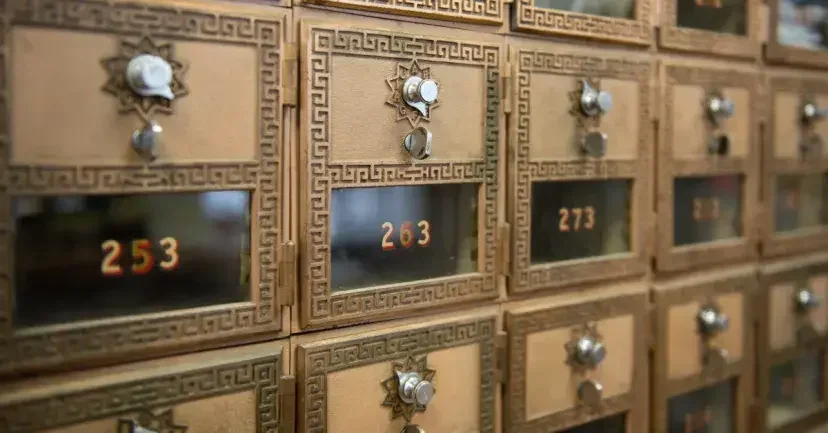For many reasons, traditional mailboxes aren't right for everyone. Fortunately, many alternatives could fit your lifestyle or your business needs. One of the most common alternatives to a regular mailbox is a post office box (P.O. box).
P.O. boxes are quite popular because they help address some of the limitations of a physical mailbox, like security and privacy. We'll explain how P.O. boxes work, why people decide to rent them, and shed some light on how to get a P.O. box without a physical address.

What is a P.O. box?
U.S. Postal Service P.O. boxes are lockboxes housed at local post offices. P.O. boxes are probably the most common alternative to traditional mailboxes, and individuals or businesses can use them. P.O. boxes typically come in a range of sizes and are available at post offices. Access to P.O. boxes in some post office locations is available 24/7 for convenience.
Why do people sign up for P.O. boxes?
P.O. boxes are generally considered to be a more secure option than traditional mailboxes. A common reason people sign up for mailboxes is to maintain their privacy because P.O. boxes are tied to mailing addresses, as opposed to physical or residential addresses. P.O. boxes offer people a way to receive postal mail without having to tell senders where they live. Additionally, unlike most mailboxes, P.O. boxes are locked or require a code to access. This adds another layer of security than most mailboxes.
People sign up for P.O. boxes because they may not regularly have access to their physical mailbox. For example, people who travel for work or for extended periods of time are not necessarily able to keep up with their physical mailbox without the help of a friend or neighbor. This can pose other security risks, of course.
The limitations of a P.O. box
While a P.O. box certainly has many benefits, there are some things you'll want to consider before renting one. Most notably, if you are a frequent traveler or lead a nomadic life, keep in mind that you will still not be able to keep a close eye on what you receive.
Of course, you can pair a personal P.O. box with USPS Informed Delivery and stay abreast of what you receive. Informed Delivery is a free service offered by USPS that sends users pictures of the outside of incoming postal mail pieces. Informed Delivery keeps you posted about what pieces of postal mail you're receiving. However, even if you know you are receiving something important or time-sensitive, you won't be able to see your postal mail contents with Informed Delivery, much less act on it.
If you frequently receive packages, a P.O. box is probably not the best option for you. Major carriers like UPS and FedEx will not deliver packages to P.O. boxes provided by USPS. Even if senders are not using these carriers, you may still run into issues because of the P.O. box size. In that case, the post office will typically hold onto the package for you at the desk, but this can still be a nuisance if you plan to regularly receive packages.
How to get a P.O. box without a street address
One of the biggest limitations of a USPS P.O. box is that you must provide a permanent, physical address to be eligible for one. This poses an issue for nomadic people who don't maintain a traditional, permanent residence.
Do you need a street address for a P.O. box?
That being said, there are still options. If you don't mind not being able to open or act on your postal mail remotely, you can research private P.O. box services offered by companies instead of the USPS. Depending on your service provider, you may not need to have a permanent address to sign up. Of course, you'll also want to look into any restrictions about packages for your service provider.
P.O. box alternatives
However, there is one alternative to a traditional P.O. box that doesn't have the same restrictions and gives you more power to act on your postal mail. A virtual mailbox or virtual P.O. box offers you much of the same security that a P.O. box does. With a virtual mailbox, you will receive a virtual address. This address is a real, physical address offered by the service provider and is not tied to where you live or work.
LegalZoom accepts postal mail on behalf of its customers, scans the content, and uploads copies as PDFs available within their account, just like email. LegalZoom does not have carrier restrictions for packages, and we can receive and forward packages or physical copies of your postal mail as needed. A virtual mailbox or P.O. box will give you all the security benefits of a traditional P.O. box while also offering added capabilities and convenience.
Is a P.O. box right for me?
P.O. boxes are a very common alternative to traditional mailboxes, and for good reason. They offer enhanced security for your postal mail and can be very convenient in terms of proximity, depending on your location and needs.
Overall, a traditional P.O. box can certainly help address any security concerns you have about your current mailbox. However, they are not the best choice for everyone. If you plan to receive packages frequently or don't want to wait until you are able to visit your mailbox to act on your postal mail, you definitely should know how to get a P.O. box, and you should consider a virtual mailbox provider like LegalZoom.
A virtual mailbox will offer the same security benefits as a P.O. box, but without some of the limitations.
How to write a P.O. box address
When you address a letter to a P.O. box, you simply put the P.O. box number where you typically put the street address. To properly address a letter, first write the recipient's name in the first line, then a company name if applicable. The P.O. box number you need to write below that, followed by the city, state, and, finally, ZIP code. To ensure non-problematic delivery, make sure the format of the address meets the USPS guidelines.
P.O. box without street address FAQs
Can I get a P.O. Box if I don't have a permanent street address?
You cannot get a traditional USPS P.O. box without a permanent street address. However, private mailbox companies and virtual mailbox services don't require a permanent address. These services give you a real street address where you can receive mail and packages from any delivery company.
What's the difference between a virtual mailbox and a regular P.O. box?
A virtual mailbox scans your mail and lets you read it online from anywhere in the world, while a regular P.O. box requires you to physically go pick up your mail. With a virtual mailbox, you get a real street address (not a P.O. box number) and can receive packages from UPS, FedEx, and other carriers that won't deliver to P.O. boxes. Virtual mailboxes also let you tell the service what to do with each piece of mail through an app or website. You can have them throw away junk mail, forward important letters to wherever you are, or even deposit checks for you. Regular P.O. boxes just hold your mail until you come get it.
How much does it cost to get mail service without a street address?
Virtual mailbox services typically cost between $29 and $100 per month, depending on how many features you need. Private mailbox services at places like UPS Store usually cost $15 to $50 per month. Regular USPS P.O. boxes cost $10 to $200 per month. All of these costs are subject to change at any moment. The cheapest option is USPS General Delivery, which is completely free. This service holds your mail at a local post office for up to 30 days, and you just need to show ID to pick it up. However, you can't use this for business purposes or large packages.
Can I use a virtual mailbox address to start a business?
Yes, because it provides a real street address. Most states require businesses to have a physical street address (not a P.O. box) listed when you file paperwork to start your company. When you register a business using your home address, that information becomes public, and anyone can look it up online. Virtual addresses solve this problem by giving you a professional business address that's separate from where you actually live.
What options do homeless individuals have for receiving mail?
Homeless individuals can get free mail service through several USPS programs designed specifically to help people without permanent addresses. The Homeless Assistance Program provides free P.O. Boxes when you get verification from a shelter or social service agency. You can also use General Delivery service at any post office for free. This means the post office will hold your mail for up to 30 days, and you just need to show ID to pick it up. Some post offices also accept alternative forms of ID if you don't have a driver's license, like a combination of voter registration and employment documents. If you have no ID, speak to your local postmaster, and they can help you.
How do I set up a virtual mailbox service?
Setting up a virtual mailbox is pretty straightforward and usually takes just a few steps online. First, you choose a service provider like LegalZoom and pick a plan that fits your needs. Then you fill out USPS Form 1583 and have it notarized. After that, you file a change of address with the post office to redirect your mail to your new virtual address. Most services will walk you through each step, and you can usually start receiving and viewing your mail within a few days.
Can virtual mailboxes receive packages from all delivery companies?
Yes, virtual mailboxes can receive packages from USPS, UPS, FedEx, DHL, and other delivery companies because they use real street addresses instead of P.O. box numbers. When a package arrives at your virtual mailbox, you'll get an email notification with a photo of the package. You can then choose to have it forwarded to wherever you are, held for pickup, or even opened and scanned if it contains documents. This makes virtual mailboxes perfect for people who travel a lot or run online businesses from different locations.

